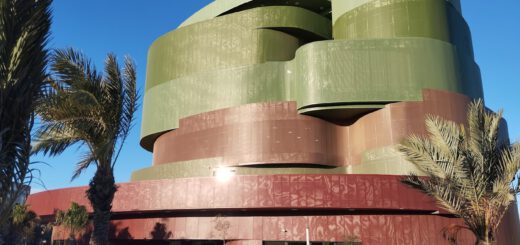Planning to apply for a PhD fellowship?
Host Organization: CBGP (UPM-INIA) – Centro de Biotecnología y Genómica de Plantas
Doctoral INPhINIT Fellowships Programme – Incoming. Call for applications 2021 (LINK)
The Centro de Biotecnología y Genómica de Plantas (CBGP) is a joint research centre of the Universidad Politécnica de Madrid (UPM) and the Instituto Nacional de Investigación y Tecnología Agraria y Alimentaria (INIA). The CBGP (UPM-INIA) is located at the Montegancedo International Campus of Excellence of the UPM (Pozuelo de Alarcón, Madrid). Research activities at the CBGP (UPM-INIA) are focused on plant biology and plant-organism associations. CBGP (UPM-INIA) generates science of excellence in areas like plant development, plant-organism interactions, responses of plants to abiotic stresses, plant nutrition and computational biology, which have resulted in the generation of novel technologies and applications. In addition, CBGP (UPM-INIA) has relevant educational and training roles for Bachelor, Master and PhD students, and technicians, and has contributed to impulse the scientific carrier and leadership of Young Scientists.
Strategic objectives of CBGP are:
- Generation of knowledge on the genomics and biotechnology of plants and plant-interacting organisms.
- Development of new technologies and tools for functional analyses.
- Development of new products and processes relevant to the productive sectors.
- Transmission of information and implementation of educational programmes for scientists and technicians.
The center has a main building of 7,200 m2 with state of the art laboratories and scientific infrastructures (metabolomics, cell biology platforms and a P3-level containment lab). In a nearby building is located the Plant Growth Laboratory with plant growth chambers and 1,200 m2 of greenhouse, including a certified P2-level greenhouse for genetically modified organisms.
ADDRESS
Campus de Montegancedo, Universidad Politécnica de Madrid
AREA OF KNOWLEDGE
Life Sciences Panel
GROUP OF DISCIPLINE
Biotechnology, Bioinformatics, Pharmaceuticals, Food Technology
GROUP LEADER
Prof. Stephan Pollmann
stephan.pollmann@upm.es
RESEARCH PRODUCT / RESEARCH GROUP
Official website of the group
https://pollmannlab.com
Representation of the group on the website of the CBGP
PLANT HORMONAL REGULATORY NETWORKS
POSITION DESCRIPTION
Research Project / Research Group Description
Plants have to cope with ever-changing and sometimes adverse environmental conditions. To deal with these circumstances, they have developed a wealth of developmental solutions to shape their body plan and optimize their metabolism in response to given environmental demands. Such responses rely upon the remarkable developmental flexibility of plants, including permanent meristematic activity, de novo organogenesis, and the enormous capacity for regeneration. The coordination of plant growth and development in response to external stress cues requires an efficient communication not only of single cells, but rather of whole tissues, and employs a tightly controlled and highly complex network of low abundant signalling molecules, referred to as phytohormones. Our lab discovered that the biosynthesis of the major plant growth factor, indole-3-acetic acid (IAA), is intimately connected with responses to biotic stress stimuli (Hentrich et al., 2013) and that formation of metabolic channels contributes to stress triggered adaptations (Pollmann et al., 2019).
To mitigate the detrimental effects of global climate change, plants have to strictly balance their energy and water resources with their growth and defence programs. Recently, we demonstrated that the auxin precursor indole-3-acetamide (IAM) plays a key role in orchestrating the crosstalk between auxin and the stress hormones abscisic acid and jasmonic acid (Pérez-Alonso et al., 2020), and that the ratio between IAA and IAM conditions seed growth through the transcription control of potassium transporter (Tenorio-Berrío et al., 2018). However, the underlying molecular control circuits still remain elusive. This project will exploit the large amount of available RNA sequencing data from auxin biosynthesis mutants and chemical treatments to investigate IAM perception and signal integration in plants and its impact on abiotic stress resistance.
Job position description
The pre-doctoral researcher will use computational tools to quantify the abundance of novel molecular targets in RNA sequencing data from IAM-treated and non-treated Arabidopsis samples. Over-represented transcription factors will be identified, and gene regulatory networks will be inferred. Further analysis of the most promising candidates will be achieved by employing a thorough reverse genetics approach and cutting-edge genome editing tools.
The work will be embedded in the bigger research activity of the host laboratory of Prof. Stephan Pollmann. Since more than 10 years, Prof. Pollmann is Principal Investigator at the CBGP in Madrid, and one of the Lead Scientists of the Severo Ochoa project of the Center. The candidate will gain interdisciplinary hands-on training on state-of-the-art “omics” technologies, e.g. metabolomics, transcriptomics, as well as Machine-learning, FAIR Data Publishing, and multi-dimensional integrative bioinformatics. Furthermore, the candidate will gain advance training in experimental design and analysis, manuscript and project preparation, and other scientific skills. Apart of this, the pre-doctoral researcher will benefit from the formation in additional soft skills, including knowledge transfer and the protection of intellectual property rights.
The formation of junior scientists in the Pollmann lab is not only restricted to the transfer of technical knowledge, but rather to promote and foster critical, interdisciplinary and creative out-of-the-box thinking on the basis of a solid theoretical background. In this respect, efficient communication and mutual knowledge transfer among group members is a major policy of our laboratory. For this reason, laboratory meetings are held on a regularly basis, in order to stimulate critical scientific discussions among group members about their different projects, including the assessment of available published data in the field.


